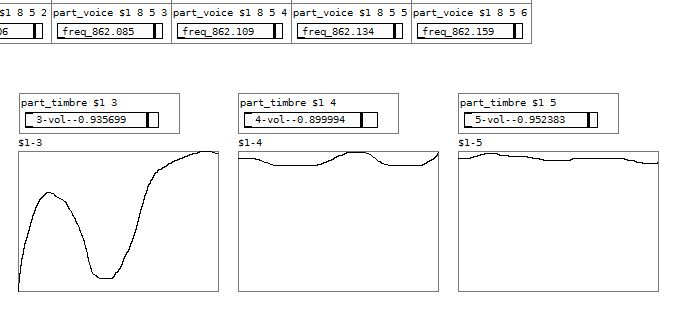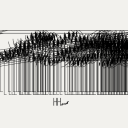@H.H.-Alejandro It seems that your computer is quite powerful....... that is good news.
[voice_gen128microtonal] contains 128 sine wave oscillators...... so you have 3840 running if you have 30 voicegens......... impressive.
You need 30 curves ....... 3 to 32..... to drive that.
David.
-
16 parameters for 1 voice, continued...
-
@whale-av thanks David! i checked out all the specifications when i bought it, it was a pretty good deal. but yeah 3 to 32, that is exactly what i have and it didnt sound. should i change in route control all the effects to local? :0
-
@H.H.-Alejandro Hello Ale.
Not finished....... just for testing..... Ale4.zipAll effects and audio meters etc. removed...... and only the first 2560 sines have micro adjustment.
In 1_vod_12_2560 it takes curves 3 to 18.
When running iannix I seem to get some distortion...... but if I stop sending the curves from iannix it is better.
This suggests that the messages are interfering with the audio..... but I am not sure...... in fact I think not....... something else.... maybe high frequency beating.
When you stop iannix....... or it gets to the end of the curves.... you can hear the beating at different rates of the sine waves....... it is interesting..... but starting the curves again makes it less audible.Maybe massive sines controlled by curves are less interesting than massive sines on their own?
I will build one with only one curve for every sine..... to hear what Pieter suurmond expected..... so with a fixed note.vod_13_20480 and vod_14_50960 are there for you to try..... (20480 sines and 50960 sines).
They take a while to load...... and for me they just distort..... but they really are a massive "ask" of the computer.
As I said above they are not finished. A lot of work needs to be done for all the curves to be used....... and as I think they will not work I have not done the work yet.I really like 1_vod_12_2560 when iannix stops...... it is endlessly changing and interesting......
David. -
@whale-av I love it how the post is named "16 parameters for one voice" and ended up in the extreme...hahah, 1_vod_12_2560 is pretty neat, sounds a lot like an organ, and yes the end is pretty interesting, hearing the different patterns of the sine waves. it would be nice to play with their intensities while there are no curves left, to see how different timbres are formed, i dont think exclusion is the way but rather integrating everything, a time for curves then those curves could sit still, the glissandi, then microtonal, its the best.
but what do you mean a curve for each sine? that would be a lot of curves, wouldnt it be better for one curve to control all their intensities? like the way you had done: each sine with a graph and only one curve controlling their position on the graph(maybe a graph generator to generate for each sine a graph, or for example: 2000 graphs to be followed by all the sine waves). or like the way we did way back when forming a list to pass through combinations of the sine´s volumes.
BtW, vod_13_20480 and vod_14_50960 didnt work, i just heard sometimes like glitchy noise, like a "popping". -
@H.H.-Alejandro Hello Ale......
If you redraw the timbre curves for the higher frequencies (something) like this then you will have a brighter timbre all the time regardless of the note/timbre curve "Z" value......
David.
-
@whale-av ok ill do that!
-
@whale-av hey, so I made this patch, it doesnt have abstractions, i havent practiced them yet, but would this be considered additive synthesis? 5 sinewaves, different frequencies, and start at the same volume but end differently...additive synthesis.zip :0,
for additive synthesis each sine must be at a different frequency and volume right? so I could be making glissandi in pitch and volume and it would still be considered additive synthesis? -
@whale-av this is the same idea but with 10 sine waves, it changes alot...addsin10.zip


